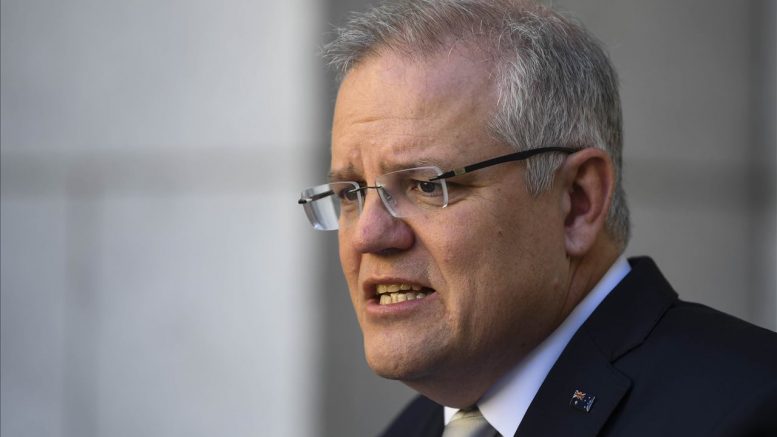Australian Labor Senator Kim Carr says Australians also need answers. For example, will the United States exercise control over how the submarines are built, as well as how they are ultimately deployed?
Australian Prime Minister Scott Morrison has tried to evade the many questions raised by the AUKUS nuclear subs deal unveiled last week.
The questions do not only involve the subs deal itself, but also the massive act of deception perpetrated by his government as it prepared to abandon a contract with the French shipbuilder Naval Group to build 12 conventionally powered submarines.
The government deceived the company, Australian workers and their unions, committees of the Australian Parliament, and the French government.
In the wake of the announcement, 400 Australian shipyard workers who would have worked on the French contract have lost their jobs.
In his press conference announcing AUKUS, Mr Morrison (pictured above) admitted that Australian officials had begun planning 18 months ago for a switch to build American or British nuclear boats.
Yet all through that time, the government’s public stance was that the French deal was secure. On several occasions, he or his ministers assured the French Government that this was so.
It was no secret that Australia was concerned at delays and cost blowouts in the Naval Group project – the initial estimate of A$50 billion had nearly doubled, to A$90bn.
The final contracts had provided for 60 per cent local content. Whether the cost blowouts were at the Australian or the French end will no doubt be matters of dispute during the compensation negotiations that must now take place.
The blowouts are why Mr Morrison and his Defence Minister, Peter Dutton, are trying to pretend that France shouldn’t have been surprised when Australia pulled out: “They should have seen it coming”.
That is not, however, what they were saying to their French counterparts during the 18 months of secret negotiations with the United States and the United Kingdom.
In June this year Mr Morrison visited the OECD in Paris, where he spoke about the Naval Group project with President Emmanuel Macron. This is how he described their talks to Australian journalists:
“It was a very positive discussion … there have been issues that we have had to address over particularly the last eight months and President Macron and I have a very, very open and very transparent, and very friendly relationship where we can speak candidly to each other about these issues.”
An open, transparent, and friendly relationship? Mr Morrison was anything but open and transparent. By his own admission, he was already planning to ditch the Naval Group deal.
“I’ve seen and learned how deep it is for an Australian when you commit to watch each other’s back. What makes me sad is that we thought we were mates and we were stabbed in the back”.
Jean-Pierre Thebault, French ambassador to Australia
His conduct during his conversation with President Macron can hardly be described as friendly, either, because friends do not deceive each other in the way that Australia deceived France.
As late as August, Australia’s foreign and defence ministers in a joint communique issued with their French counterparts, “reaffirmed the shared values, interests and principles that underpin the bilateral relationship” and “underlined the importance of the Future Submarine program”.
If there were problems with the Naval Group project that could not be resolved, the government should have declared openly that it did not intend to continue the contract.
The government has yet to explain why it did not do so. Was that decision made in Canberra only, or did the US have reasons for wanting to keep France out of the loop?
The French ambassador to Australia, Jean-Pierre Thebault, noted that Australian media reports had highlighted the extent to which the Australian Government went out of its way to deceive the French government.
When the French were informed of Australia’s real intentions is a matter of dispute – Mr Morrison says it was the night before the AUKUS announcement, but a French newspaper has reported that it was not until the announcement itself.
Let’s not quibble about a matter of hours. The fact is that the Australian government deliberately kept Naval Group and the French government in the dark for 18 months, and it should not have been surprised by the furious French reaction.
Ambassador Thebault – now recalled to Paris, along with the ambassador to the US – said on his way to the airport: “I’ve seen and learned how deep it is for an Australian when you commit to watch each other’s back. What makes me sad is that we thought we were mates and we were stabbed in the back”. The French foreign minister, Jean-Yves Le Drian, also described Australia’s repudiation of the Naval Group deal as a stab in the back, saying that it was not how allies behave.
The recall of ambassadors is an extremely serious form of diplomatic protest, and the damage to Australia’s reputation will not be repaired any time soon.
It is not only in Paris that the damage has been done: a trade treaty with the EU, which had been under negotiation, now looks shaky.
None of this seems to bother the Morrison Government. It has eagerly signed up to AUKUS, President Joe Biden’s new strategy to contain China, in exchange for the promise of eight nuclear submarines for an unknown price, the first of which won’t be in the water till 2040.
And, while shrugging off France’s justifiable outrage, the government has made no effort to explain itself to the Australian people, either.
The government deceived the company, Australian workers and their unions, committees of the Australian Parliament, and the French government.
Many questions remain unanswered about the new submarine deal, which will have consequences for Australian sovereignty because for many decades ahead AUKUS will lock Australia rigidly into the global strategic priorities of the US.
It will do so regardless of who occupies the White House, or Australia’s own national interest.
Mr Morrison has said that the eight nuclear submarines will be built in Adelaide, but does “built” mean manufactured, or merely assembled from imported components?
Will the US exercise control over how the boats are built, as well as how they are ultimately deployed?
How will Australia maintain, support and upgrade the subs over their life cycle without a domestic nuclear industry, which the government pretends is not necessary?
And, since the government still maintains that it wants closer defence cooperation with France, how will it repair the relationship it has broken?
Australia’s Parliament needs answers to all these questions from the government, and a new committee inquiry may be the first step in obtaining those answers.
Headline image credit: Naresh777/Shutterstock.com
Kim Carr is a former Australian minister for defence materiel, and a former minister and shadow minister for higher education, industry, innovation, science and research.




